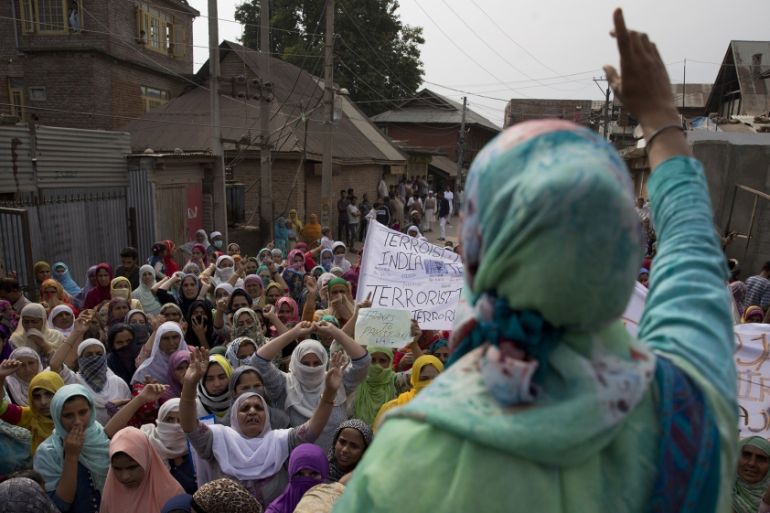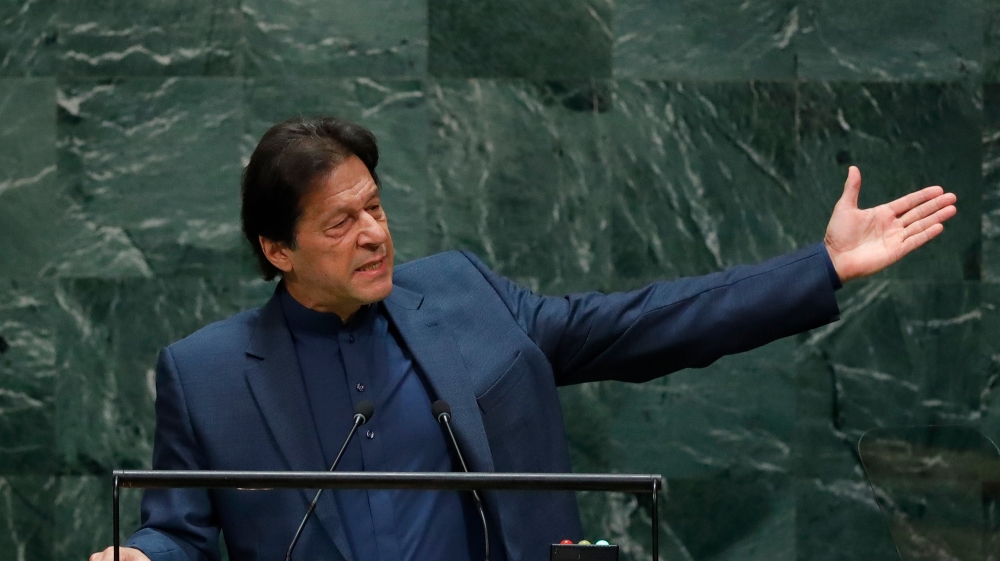‘We’re not alone’: Besieged Kashmiris hail Imran Khan’s UN speech
Kashmiris facing a crippling 55-day lockdown imposed by India welcome Pakistani PM’s statements at UN General Assembly.

Srinagar, Indian-administered Kashmir – Firecrackers were set off and slogans shouted in Srinagar, the main city in Indian-administered Kashmir, immediately after Pakistan Prime Minister Imran Khan finished his speech at the United Nations.
In his UN General Assembly address on Friday to world leaders, the Pakistani prime minister said he feared a “bloodbath” in Kashmir when the security lockdown in place since early last month is lifted.
Keep reading
list of 4 itemsUS calls for swift police deployment to Haiti after missionaries killed
UN Security Council passes motion denouncing attacks on aid workers
UN approves resolution to commemorate 1995 Srebrenica genocide
In his 45-minute address, Khan invoked the spectre of a potential nuclear war between India and Pakistan over the disputed Himalayan region if the UN and the international community did not act soon.
“What’s he going to do when he lifts the curfew? Does he think the people of Kashmir are quietly going to accept the status quo?” asked Khan, referring to his Indian counterpart, Narendra Modi.
On August 5, Modi’s Hindu nationalist government abrogated Article 370 of the Indian constitution, which granted the part of Kashmir it administers a degree of autonomy, pushing India’s only Muslim-majority state into its worst political crisis in 70 years.
India and Pakistan claim the Kashmir territory in its entirety but rule over parts of it. Many Kashmiris demand either a merger with Pakistan or an independent state.
“What is going to happen when the curfew is lifted will be a bloodbath,” said Khan. “They will be out in the streets. And what will the [Indian] soldiers do? They will shoot them … Kashmiris will be further radicalised.”

Khan’s aggressive and apparently extemporaneous speech touched a chord with many Kashmiris reeling under the unprecedented communications blackout and travel restrictions in place since August 5.
‘We are not alone’
“I felt a solace in my heart when he [Khan] talked at the UN,” said Abdul Majid, a retired government official in Srinagar.
“It felt like there is someone to watch our back. It felt that someone is talking for us, that we are not alone.”
On Saturday, a day after Kashmiris watched Khan’s speech live on TV, Indian authorities tightened restrictions in several parts of the valley, including a number of neighbourhoods in Srinagar, where concertina wires were rolled out on the roads.
While no reasons were given for the renewed restrictions, they appeared to have been sparked by Khan’s UN speech, which came almost an hour after Indian Prime Minister Narendra Modi addressed the Assembly.
In his 17-minute speech, Modi did not touch upon the Kashmir issue, an evasion that angered residents of the region, who said it was “unexpected” from the Indian leader.
“When these leaders are in India, they say Kashmir is an internal matter. When they go to global forums, they say it is a bilateral issue. But they are continuously playing with the lives of people here, pushing millions to the wall,” said Muhammad Mustafa.
Khan’s speech was the talking point on Saturday among many residents of Kashmir who said they felt buoyed by his words, which appeared supportive of their protests against Indian rule.
Kashmiris have kept their businesses and other institutions shut during the day despite the Indian government claiming the disputed region is moving back to “normalcy”.
Dozens of Srinagar residents came out in support of Khan after his UN speech, setting off firecrackers and raising slogans for independence and against Indian rule.
Residents said Islamic prayers blared through some mosque loudspeakers throughout Friday night.
“People now have a reason to continue their resistance as they feel Pakistan is willing to take a risk for Kashmir,” said Adil Ahmad.
India and Pakistan have fought two of their three wars over Kashmir.
The two arch-rivals came close to another war in February this year when India carried out air attacks deep inside Pakistan in response to a suicide bombing that killed 40 Indian soldiers in Kashmir.
“We want a solution,” said Manzoor Ahmad, 45, as he frantically attended to the customers at his department store in Srinagar’s Lal Chowk area before their daytime protest begins at 9am.
Hopes from the UN
Residents fear there will be an increase in armed rebellion in Kashmir if India and Pakistan do not resume their dialogue soon or the world community does not act.
“There will be a lot of rebel activity if nothing comes out of these world bodies,” said Mohammad Amin, a resident from a frontier district of north Kashmir. “The situation will worsen.”
While Khan has impressed many in Kashmir, others feel he has failed in mobilising the world’s opinion or in putting more pressure on the Indian government.
Danish Ahmad, a baker in Srinagar, said Khan is fighting it alone for Kashmir. “What he did is impressive but what more can he do, he has no one at his back,” he said.
The abrogation of Kashmir’s special status was accompanied by the detention of hundreds of political leaders and activists, including pro-India politicians as well as those who had been resisting Indian rule, from the region.
The crackdown against their leaders has made the Kashmiris look towards the UN, which, they hope, will undo India’s move.
The separatist movement in Kashmir, which calls for either a merger with Pakistan or political independence, is pivoted around a resolution passed by the UN in 1948.
The resolution promised a plebiscite in Kashmir, which became the bedrock of the region’s politics against Indian rule.
The resolution has never been implemented as India rejects third-party mediation on the Kashmir question, a suggestion repeatedly made by US President Donald Trump in recent weeks.
In support of its position, India cites the 1972 Simla Agreement with Pakistan, which resolved to solve the Kashmir dispute mutually between the two arch-rivals.